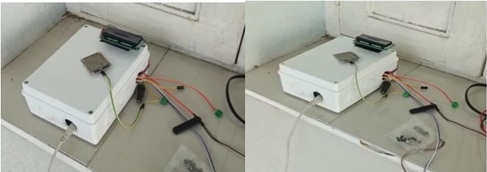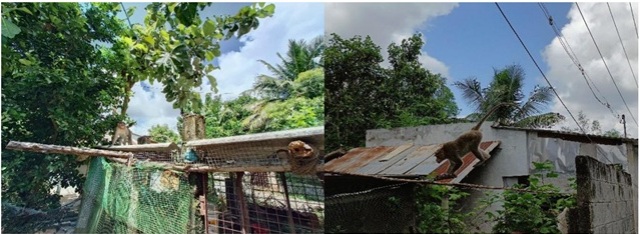Crescent Sustainability Initiatives
Affordable and Clean Energy (SDG 7)
Overview of the Crescent Energy Club
The Crescent Energy Club, affiliated with B.S. Abdur Rahman Crescent Institute of Science and Technology, is dedicated to promoting sustainable energy practices and fostering a community passionate about energy literacy and environmental stewardship. The club’s vision is to create a vibrant community that recognizes the critical role of sustainable energy in shaping the future. Its mission focuses on providing a platform for knowledge sharing, networking, and collaboration among individuals interested in energy-related fields. The club empowers its members to become leaders in the transition towards a clean and sustainable energy system through various initiatives and activities.
Green Day Celebration by IGEN
The Crescent Energy Club actively participated in the IGEN Green Day event held in Kattur Village. This event aimed to inspire individuals and communities to engage in green actions and advocate for sustainable practices. During the celebration, the club took a significant step by launching a public pledge with the local community, committing to the goal of achieving 100% renewable energy. This initiative aligns with the United Nations Sustainable Development Goals (SDGs) and emphasizes the importance of collective action in addressing climate change and promoting sustainability.
The IGEN Green Day served as a platform to recognize the contributions of various academic institutions and individuals in promoting environmental awareness. The event encouraged participants to take actionable steps towards sustainability, fostering a sense of responsibility and community engagement.
Commitment to 100% Renewable Energy
The public pledge made during the IGEN Green Day is a pivotal part of the Crescent Energy Club’s mission to advocate for renewable energy. By engaging with the local community, the club aims to raise awareness about the benefits of transitioning to renewable energy sources and the importance of sustainable practices. This commitment not only reflects the club’s dedication to environmental stewardship but also serves as a model for other institutions and communities to follow.
Through ongoing initiatives, educational programs, and community engagement, the Crescent Energy Club seeks to inspire individuals to adopt renewable energy solutions and contribute to a sustainable future. The pledge for 100% renewable energy is a call to action for everyone to participate in the transition towards a cleaner, greener planet.
Inspiring Change: From Campus Initiatives to Community Empowerment
B.S. Abdur Rahman Crescent Institute of Science and Technology has strategically committed to transitioning towards 100% renewable energy, establishing a ground breaking model for educational institutions across Tamil Nadu and India. The institute’s comprehensive approach leverages its Energy Centre for Sustainable Development and green campus initiatives to demonstrate practical renewable energy solutions. Specifically, their solar-based bird protection project at Kattur Village, funded by Unnat Bharat Abhiyan, serves as a compelling showcase of how renewable technologies can be effectively integrated into agricultural practices while promoting sustainable development.
The project’s innovative components include solar-powered security infrastructure with motion-activated CCTV surveillance systems, bird banger technologies, and smart monitoring capabilities. By implementing zero-carbon surveillance and energy-efficient solutions, the institute not only addresses local agricultural challenges but also creates a replicable model for community engagement. The key strategy involves organizing demonstration sessions for local farmers and communities, highlighting the economic and environmental benefits of renewable energy adoption. This approach aims to inspire a public pledge toward 100% renewable energy beyond university boundaries, effectively creating a multiplier effect that can accelerate sustainable energy transitions across various societal sectors.
The broader vision extends beyond technological implementation, focusing on structured knowledge sharing and support systems that can drive widespread renewable energy adoption. By showcasing real-world applications and tangible impacts, B.S. Abdur Rahman Crescent Institute is positioning itself as a catalyst for sustainable transformation. The initiative directly contributes to Sustainable Development Goal 7 (SDG7), demonstrating how educational institutions can play a pivotal role in promoting renewable energy awareness and practical implementation at community levels. The ultimate goal is to create a scalable and inspirational model that encourages other communities and institutions to embrace renewable energy solutions, thereby contributing to a more sustainable future.
The journey toward 100% renewable energy requires practical demonstrations of sustainable solutions that can inspire broader adoption. The solar-based bird protection project implemented at Kattur Village through BSACIST, funded by Unnat Bharat Abhiyan, serves as an excellent example of how renewable energy can be effectively integrated into agricultural practices while promoting sustainable development.
Project Overview and Impact:
The completed project demonstrates the practical application of solar energy in agricultural settings, specifically in poultry farming. This initiative showcases how renewable energy solutions can address real-world challenges while promoting sustainable practices beyond university boundaries.

Figure VII (4.2) – 1 : Data Guard: Smart Analytics for Proactive Predator Management
Key Components and Innovations:
- Solar-Powered Security Infrastructure:
- Implementation of motion-activated CCTV surveillance systems
- Integration of bird banger systems powered by solar energy
- Smart monitoring capabilities with data logging features
- Real-time threat detection and response mechanisms
2. Sustainable Technology Integration:
- Zero-carbon surveillance and protection systems
- Energy-efficient motion-activated features
- Data collection and analysis capabilities for continuous improvement
- Demonstration of renewable energy reliability in critical operations
Expanding the Renewable Energy Pledge:
- Community Engagement Strategy:
- Showcase successful implementation at Kattur Village as a model
- Organize demonstration sessions for local farmers and communities

Figure VII (4.2) – 1 : Green Surveillance: Solar-Powered CCTV Innovation in Poultry Management
The successful implementation of the solar-based poultry protection project at Kattur Village demonstrates the practical viability of renewable energy solutions in agricultural settings. This project serves as a powerful catalyst for promoting a public pledge toward 100% renewable energy adoption beyond university boundaries. By showcasing real-world applications, economic benefits, and environmental impacts, this initiative can inspire other communities and institutions to embrace renewable energy solutions.
The path forward involves expanding this successful model through structured knowledge sharing, community engagement, and support systems. By promoting a public pledge toward 100% renewable energy, we can create a multiplier effect that accelerates the transition to sustainable energy systems across various sectors of society, contributing significantly to the achievement of SDG7 goals.
POLICY FOR ENERGY-EFFICIENT RENOVATION AND BUILDING
Issue: 04; Revised on 2023
| Policy Created on | July 2009 |
| 1st Revision amended on | IQAC Meeting held on 27th October 2017 |
| 2nd Revision amended on | IQAC Meeting held on 31st March 2021 |
| 3rd Revision amended on | IQAC Meeting held on 16th June 2023 |
Responsible Executive : Director (IQAC)
Responsible Office : Internal Quality Assurance Cell, Estate Office, and SDG Cell
Contacts : Registrar, Director (IQAC)
The B.S. Abdur Rahman Crescent Institute of Science and Technology is committed to ensuring that all renovations and new constructions on campus adhere to stringent energy efficiency standards. This policy aims to:
- Ensure universal access to affordable, reliable, modern energy services.
- Increase substantially the share of renewable energy in the global energy mix.
- Double the global rate of improvement in energy efficiency
- Enhance international cooperation to facilitate access to clean energy research and technology.
- Expand infrastructure and upgrade technology to supply modern and sustainable energy services, particularly in developing countries.
7.2 REASON FOR THIS POLICY
This policy is established to promote energy-efficient practices in renovating existing infrastructures and constructing new buildings. By adhering to energy efficiency standards, the Institute aims to reduce greenhouse gas emissions, lower operational costs, and contribute to the global efforts to combat climate change, which aligns with SDG 7 – Affordable and Clean Energy.
7.3 RESPONSIBILITIES
7.3.1 Policy Principles
The Institute shall implement the following principles to ensure compliance with energy efficiency standards:
- All renovations and new constructions must achieve recognised building rating systems such as EDGE, IGBC, and LEED.
- Sustainable design features, including using renewable energy sources, shall be integrated into all projects.
- An efficient waste management plan shall be established to minimize waste and promote recycling.
- Rainwater harvesting systems shall be implemented in all new buildings.
- Energy conservation shall be prioritized through the installation of energy-efficient appliances and equipment.
- Regular audits of energy consumption shall be conducted to identify areas for improvement.
- Use of low VOC (Volatile Organic Compounds) materials in construction and renovation to minimize harmful emissions.
- Adoption of eco-friendly housekeeping practices using biodegradable chemicals.
- Implementation of high reflective roofing materials and green roofs to reduce heat island effects.
- Encourage water-efficient landscaping and high-efficiency irrigation technology in new construction projects.
- Support R&D activities towards energy-efficient renovation and building.
- Enhance national/international cooperation to facilitate access to green building technology.
- Dissemination of Policy
- Awareness programs shall be conducted regularly for all stakeholders regarding energy-efficient practices.
- This policy shall be publicly accessible on the Institute’s website and updated as necessary.
7.3.3 Enforcement of Policy
- The Director (Planning and Development) and their team are responsible for monitoring compliance with this policy.
- Compliance shall be communicated to architects, design engineers, and construction workers involved in projects.
7.2.1 – ENERGY EFFICIENCY POLICY.pdf
POLICY FOR DIVESTMENT FROM CARBON-INTENSIVE ENERGY INDUSTRIES
Issue: 04; Revised on 2023
| Policy Created on | July 2009 |
| 1st Revision amended on | IQAC Meeting held on 27th October 2017 |
| 2nd Revision amended on | IQAC Meeting held on 31st March 2021 |
| 3rd Revision amended on | IQAC Meeting held on 16th June 2023 |
Responsible Executive: Director (IQAC)
Responsible Office: Internal Quality Assurance Cell, Estate Office, and SDG Cell
Contacts: Registrar, Director (IQAC)
The B.S. Abdur Rahman Crescent Institute of Science and Technology is committed to divesting from carbon-intensive energy industries, particularly coal and oil, to promote sustainable energy practices and contribute to the global efforts to combat climate change. This policy aims to:
- Ensure universal access to affordable, reliable, and modern energy services.
- Increase substantially the share of renewable energy in the global energy mix.
- Double the global rate of improvement in energy efficiency.
- Enhance international cooperation to facilitate access to clean energy research and technology.
- Promote investment in energy infrastructure and clean energy technology.
7.2 REASON FOR THIS POLICY
This policy is established to minimize the Institute’s carbon footprint by reducing investments in fossil fuels and promoting renewable energy sources. By divesting from carbon-intensive industries, the Institute aligns with the United Nations’ Sustainable Development Goals, particularly SDG 7: Affordable and Clean Energy, and supports the transition to a sustainable energy future.
7.3 RESPONSIBILITIES
7.3.1 Policy Principles
The Institute shall implement the following principles to ensure effective divestment from carbon-intensive energy industries:
- Conduct a comprehensive review of current investments to identify carbon-intensive assets.
- Gradually divest from all investments in coal and oil industries within a specified timeframe.
- Reallocate funds towards renewable energy projects and sustainable technologies.
- Collaborate with financial institutions that prioritize sustainable investment practices.
- Promote transparency in investment decisions and publicly report on divestment progress.
- Engage with stakeholders, including students and faculty, to raise awareness about the importance of divestment from fossil fuels.
- Support research and development initiatives focused on clean energy technologies.
7.3.2 Dissemination of Policy
- This policy shall be publicly accessible on the Institute’s website to ensure transparency.
- Awareness programs shall be conducted regularly for all stakeholders regarding the importance of divestment from carbon-intensive industries.
- Updates on divestment progress shall be communicated through newsletters and reports.
7.3.3 Enforcement of Policy
- The Director (Finance) and their team are responsible for monitoring compliance with this policy and reporting on divestment progress.
- Any breach of this policy may result in a review of investment strategies and potential disciplinary actions as prescribed by the Institute’s code of conduct.


